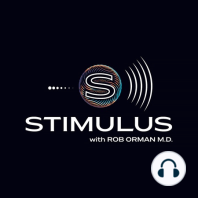62 min listen

52. Listening to Podcasts for Maximal Retention | Interstitial time, task type, hour of day, driving vs undivided attention
52. Listening to Podcasts for Maximal Retention | Interstitial time, task type, hour of day, driving vs undivided attention
ratings:
Length:
31 minutes
Released:
Jun 14, 2021
Format:
Podcast episode
Description
Most of us don’t give a lot of thought to how and when we listen to podcasts. But like most of life, an intentional approach can reap benefits. In this episode, Josh Russell walks us through: strategies for maximizing retention, listening based on brain state, new data on listening while driving, the value of silence. Guest Bio: Joshua Russell, MD is clinician, writer, and educator. Since completing residency training in Emergency Medicine, Dr. Russell has had a varied career including supervising PAs and NPs as a medical director for a regional Urgent Care network, contributing to various Hippo Education podcasts, and serving as the Editor-in-Chief of the Journal of Urgent Care Medicine (JUCM). Most recently, he has completed fellowship training in Hospice and Palliative Medicine at the University of Chicago Medical Center. This episode is in support of the I AM ALS. I AM ALS was founded by Brian Wallach and his wife Sandra shortly after his diagnosis at the age of 37. He was given 6 months to live, and now 4 years later he is leading a revolution to find a cure. People often refer to ALS as rare, which is not really so. The lifetime risk is around 1 in 300. Since Lou Gehrig was diagnosed 80 years ago, available treatments have been shown to extend life a mere 3 months. I AM ALS supports research, legislation to fast track therapies, and provides critical resources to patients and caregivers. ALS is relentless, and so are they. The question is no longer if we'll find a cure for ALS, but when. This is an underfunded disease and every little bit makes a difference. We will match donations to I AM ALS up to $5000 -- get started here on our Stimulus Donation Page. And for your daily dose of positivity, follow Brian on Twitter. We discuss: Strategies for maximizing retention of podcast content [04:20]; Listen to educational podcasts when your mind is fresh, such as when on your way to work rather than commuting home after a long day. Our limited amount of attention is relatively fixed, but it does depreciate as the day goes on and our energy wanes. Many choose to listen to podcasts during “interstitial time”, like when driving, exercising, or grocery shopping. You’re more likely to retain information if you’re doing a task that doesn’t require your full attention. How your working memory is like the RAM of your brain [08:40]; Just like a computer will become bogged down and slow when it’s overloaded, so too does your brain processing speed diminish when cognitively overloaded. If your working memory is doing something fairly simple, like driving down the highway, then you have a fair amount of residual attention that you can spend on something like listening to a podcast. While driving through a busy city, however, the residual attention is going to be much less. Why Josh prefers to listen to podcasts in the morning as this is when he is best able to focus [10:20]; Josh is often trying to cram podcasts into the interstitial spaces of life, but he finds that his mental ability to focus and vigilance are highest in the morning. This is the time that it makes the most sense to devote attention to something that involves integrating new information. As his ability to focus wanes, it becomes less and less productive to listen to informational podcasts. Similarly, it is common for people to do their “deep work” (that which requires the most attention) during the morning hours and “shallow work” later in the day. The importance of using your brain for tasks that are appropriate for the state that it’s in [12:45]; When we first wake up, the vigilance that we have is very helpful for detail oriented tasks where we have to focus and pay attention. Conversely, we’re not so great at coming up with creative and innovative solutions to problems at that time. As the day goes on and attention wanes, napping or taking a deliberate break can help restore vigilance. Towards the end of the day, w
Released:
Jun 14, 2021
Format:
Podcast episode